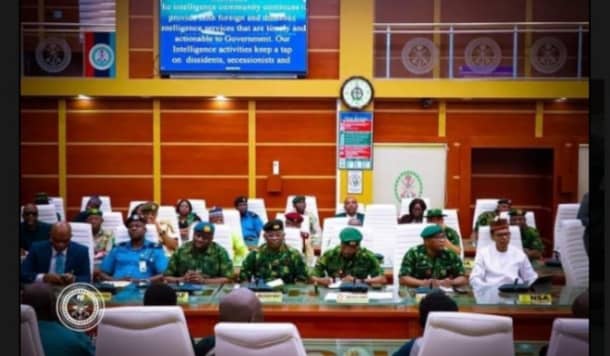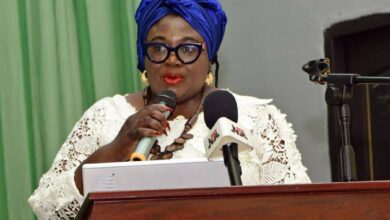Security: Agencies Unveil Strategic Priorities To Counter Regional, Global Threats
By Anne Osemekeh, Abuja

The Strategic Communications Interagency Advisory Policy Committee, has unveiled strategic priorities on which all security agencies in the country will focus to preempt and counter security threats more effectively.
The strategies were unveiled on Thursday, 6 June, 2024, at a joint press briefing by security, defence and response agencies, at the Defence Headquarters in Abuja.
The Strategic Communications Interagency Advisory Policy Committee serves as the umbrella body for the spokespersons of all Nigerian security and response agencies facilitating unified and strategic communication to highlight the collective successes of our agencies over the past year.
The committee highlighted such strategies as:
strengthening intelligence-sharing mechanisms, ensuring a people-oriented approach to securing our communities,
investing in advanced technologies and equipment to enhance the capabilities of our security forces, and
deepening partnerships with international allies to tackle regional and global security challenges and leverage best practices.
The committee stressed that, “the key to our successes has been robust interagency collaboration, ensuring that our security operations are comprehensive, strategic, and effective”, and that the achievements recorded “are the result of our coordinated efforts to enhance national security and protect the lives and property of our citizens”.
Presenting its update, the Office of the National Security Adviser (ONSA) said it has been pivotal in coordinating national security strategies and ensuring synergy among various security agencies.
During the period under review, the office successfully hosted the High-Level Africa Counter-Terrorism Meeting, which brought together African Heads of Government, including President Bola Ahmed Tinubu, who served as the host President, the UN Deputy Secretary-General, and leaders of other key global bodies. These discussions focused on stability in the Sahel Region and garnered significant commitments to combat terrorism and violent extremism.
The Office also facilitated the second leg of the UK-Nigeria security and defence dialogue, bringing together security and defence chiefs from both countries. Additionally, in collaboration with the Central Bank of Nigeria, the ONSA initiated series of economic security measures against currency manipulators and speculators.
Coordinating efforts in the areas of human security, food security, and interventions to resolve national issues led to increased citizen-centric approach to national security since the beginning of the administration.
The Nigerian Armed Forces on its part reported that it has,
under the leadership of the Defence Headquarters, made substantial progress in various defence operations, thanks to the interagency collaboration with other security sectors.
It said its roops neutralized 9,303 insurgents, arrested 6,998 individuals, and rescued 4,641 hostages. Notably, 9,562 Boko Haram/ISWAP combatant fighters and their families surrendered to security forces.
In the fight against oil theft, 1,437 perpetrators were apprehended, with 363 neutralized. Additionally, 245 kidnapped hostages were rescued, leading to a marked decrease in insurgent activities.
The Nigerian Navy said its increased patrols and international collaborations have led to a substantial reduction in piracy incidents in the Gulf of Guinea, with notable achievements in the last twelve months including the prevention of oil theft, and denying criminal elements access to an estimated sum of N91,247,052,565.
Troops discovered and destroyed 3,051 dugout pits, 1,276 boats, 3,924 storage tanks, and 408 vehicles, recovering significant quantities of stolen crude oil and illegally refined petroleum products, amounting to millions of liters.
In the area of intelligence, the Department of State Services (DSS) reported that it has, alongside other intelligence agencies played a critical role in safeguarding national security through intelligence gathering and covert operations, again enabled by seamless interagency coordination.
Successful intelligence-led operations have prevented numerous terrorist attacks and criminal activities. High-profile terrorist commanders and their associates were apprehended across multiple states, preventing potential catastrophic incidents.
Confiscations included illegal items such as IEDs, firearms, ammunition, and dangerous psychoactive substances. Over 21,000 pump action cartridges, 440 pump action rifles, and 228,741 rounds of ammunition were seized, preventing potential attacks by recovering suicide jackets and lethal weapons. Criminal activities involving illicit petroleum products were disrupted, with 50,000 illicit liters impounded.
Intelligence dissemination in the South-South region contributed to a reduction in oil theft. New directorates were established to enhance transparency and democratic principles, promoting security and economic stability through intelligence-sharing initiatives.
The intelligence community continuous to provide both foreign and domestic intelligence services that are timely and actionable to Government. Abroad, Intelligence activities track dissidents and secessionists, transnational organized crime involving Nigerians such as drug trafficking, human trafficking, fraud, cybercrime, money laundering, and immigration-related crimes.
“Additionally, key agencies have maintained collaboration with foreign services, identified opportunities and challenges in furthering common national, regional and international priorities set by Government. This has led to effective representation of Nigeria in regional and continental security platforms such as the ECOWAS, CISSA and other regional and continental organizations”, the DSS said.
It was revealed at the briefing that the Nigeria Police Force and other law enforcement agencies have undertaken significant reforms and operations to enhance public safety.
Key achievements include restructuring and reforming the intelligence department and reopening the Nigeria Police Intelligence School. The launch of the Special Intervention Squad (SIS) and collaboration with international partners, alongside the Schools Protection Initiative and the deployment of helicopters for train escorts along the Abuja-Kaduna route, have enhanced security measures, while digital support systems like the Nigeria Police Force Rescue Me App have been relaunched, leading to significant successes.
The Force said that in the period under review, it arrested 4,796-armed robbery suspects, 3,068 kidnap suspects, 2,474 suspects for rape/sexual crimes, 1,213 suspects for unlawful possession of firearms, 3,523 suspected cultists, 3,381 suspects for murder/homicide, and 13,382 suspects for other offences.
Additionally, 1,713 kidnap victims were rescued, and 2,566 firearms and 19,310 rounds of ammunition were recovered, along with 1,465 vehicles/motorcycles.
Also, during the period under review, the Nigerian police prosecuted 29,052 cases. Of these, 7,675 cases were conclusively dispensed, 11,376 suspects are currently undergoing trial, 51 cases are under appeal in appellate courts, and 16,200 cases resulted in the conviction of suspects who have received various punishments for their criminal acts.
Similarly, the Nigerian Security and Civil Defence Corps (NSCDC) recorded significant feats to bolster internal security and secure critical infrastructure.
Key achievements include the establishment of the National Safe Schools Response Coordination Centre (NSSRCC), foiling over 48 school attacks and kidnap attempts nationwide.
The launch of the CG’s Mining Marshall combated illegal mining activities, dismantling over 1,975 illegal mining sites. Over 165 illegal local refineries were uncovered and dismantled, and enhanced communication initiatives promoted public awareness and sensitization programs.
Concluding the presentations, the Committee, while acknowledging “that not all results can be reported due to the sensitive nature of the information available for ongoing operations”, expressed strong belief that “sharing some results from the security and defence sector will go a long way in countering misinformation and also ensuring that citizens are involved in dealing with our security challenges”.






